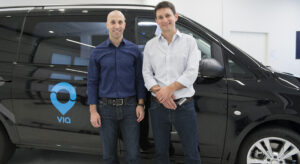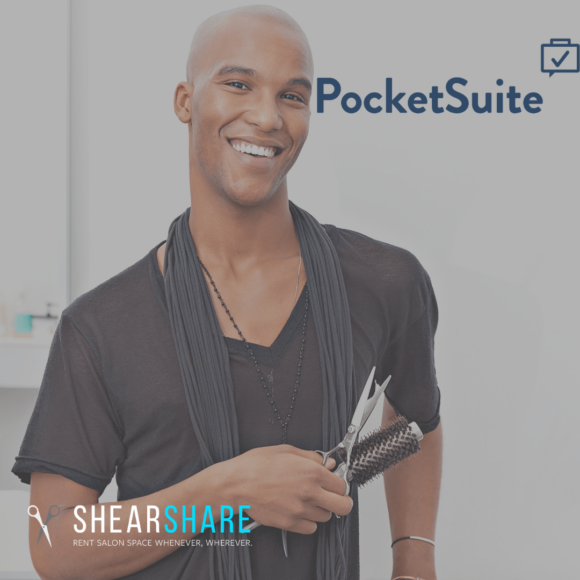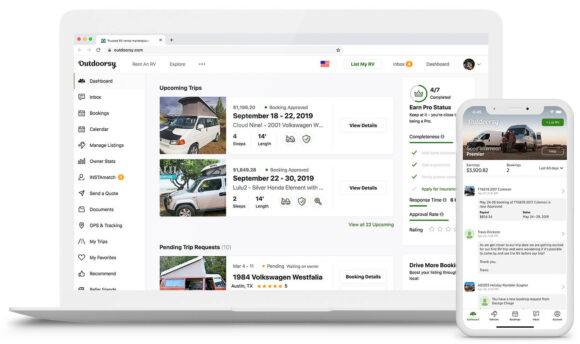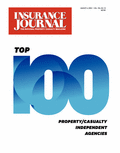Imagine insurance customers who actually enjoy meeting with their insurance broker. Customers who see insurance not as a nuisance mandate but as an integral part of their own and their customers’ success. Insurance buyers who are enthusiastic about discussing risks and coverages regularly, not just begrudgingly once a year. Customers who are eager to share data on safety and performance. Or customers who view insurance not as a cost but as a revenue builder.
These insurance customers do exist. Some of them come from the sharing economy and three of them recently shared their experiences with insurance in a Lloyd’s of London webinar titled The Sharing Economy.
Host Rosie Denee, Innovation and Thought Leadership manager at Lloyd’s, stressed how the pandemic has recalibrated the sharing economy of independent contractors, entrepreneurs, service providers, drivers, property owners, renters, riders and buyers and the technology platforms they love.
“Companies have had to adapt to changes in demand and pursue new growth opportunities, particularly in delivery services but also in urban mobility and accommodation,” she said.
“Demand for shared services now varies significantly depending on individual business models and companies are adapting to the new normal as consumer preferences may have shifted for an indefinite time.”

Denee cited Airbnb as an example. For the year 2020, Airbnb reported bookings were down 40% and revenue was down 30%. Since the pandemic started, Airbnb clients have stayed close to their homes, traveled by car, stayed longer and prioritized safety and affordability. Renters now prefer to rent a cottage or apartment over a room in a shared home.
Another example might be Uber, where ride revenues were way down during 2020. But Uber managed to pivot to offset its losses in passenger rides with deliveries of food orders by its Uber Eats business, where revenue has doubled during the pandemic, according to Reuters. Uber also acquired smaller food-delivery rival Postmates and alcoholic beverage delivery service Drizly.
Denee believes the insurance industry initially struggled with how to create protection to meet the needs of the sharing economy. But that has changed.
“Over the last 10 years the sharing economy has seen and brought with it a cultural shift in the insurance sector,” she maintained, adding that the “very essence” of the sharing economy is flexibility, which has forced insurance providers to offer more flexible insurance arrangements.
“However, much more in this space needs to be done if the insurance industry is to address the requirements of the sharing economy.”
The webinar showcased three sharing economy insurance customers:
- New York-based Via Transportation that provides on-demand ride-sharing transportation software and services for cities, schools, universities, hospitals and corporations;
- Dallas-based ShearShare, which brings together hair stylists with clients and salon workers with empty chairs; and
- Austin Texas-based Outdoorsy, a peer-to-peer rental marketplace for owners of recreational vehicles (RVs).
As different as their customers are, the three businesses and their executives have much in common, starting with their Lloyd’s insurance broker, Chris Moore. Moore heads Apollo Syndicate Management’s special unit, ibott (insuring businesses of tomorrow, today) that specializes in sharing economy companies. Moore has been with Apollo since 2013 and was instrumental in the setup of ibott. He is on the Lloyd’s innovation panel and the Lloyd’s Market Association Committee for both U.S. and International Casualty.
Moore, who works with each of these clients, says they share a perspective.
“They are not interested in off-the-shelf products. They are interested in products that are going to be tailor made to their business, that allow their platforms to grow and protect the marketplace of users of that platform,” Moore said.
Moore has come to appreciate the mindset of these technology and business entrepreneurs and enjoyed working with them to fashion and then refashion the products they need. “It’s different. When I speak to these guys, it’s not a view of insurance like, ‘It’s that time of year again. I have to renew my insurance policy,'” he said.
Rather, he maintained, they’re like he is, constantly thinking about insurance. “It’s that crucial to their business and they’re constantly looking for partners that are willing to understand them, understand their business and support them in these new products for their dynamic or changing business,” Moore said of his clients.
The entrepreneurs are, in turn, happy to have found someone who listens to them and understands how important insurance is to their current customers and to their firms’ futures.

Erin Abrams is general counsel at Via Transportation, the on-demand shared transit software platform. It offers its software-as-a-service in 200 cities and countries around the world, providing a full stack turnkey solution for private and public transit operators.
Abrams became the company’s insurance handler because she happened to make eye contact with the CEO when he asked who would do it and nobody else in the meeting looked up. She says she does not regret it. As Via has grown and scaled, insurance has become co-managed between her legal team and the finance team.
Colin Gardiner calls Outdoorsy “the Airbnb of RVs.” It has nearly a billion dollars in sales from its marketplace of people renting RVs from neighbors and strangers. It operates in Canada, the United States, Australia, New Zealand, and is moving to Europe as well.
“It’s very much a business that’s very hot right now given everyone’s stuck at home in a lot of ways,” he said.
Gardiner’s interest in insurance stems from his role as chief revenue officer. “I focus on all things growth and monetization and I think that’s a different approach,” he explained. “We don’t view insurance as a cost center. We view it as a strategic advantage so we really use it to our advantage.”
In fact Outdoorsy has evolved to become a full RV insurance provider, selling insurance for its members not only when they are renting but also when they are outside of their rental period.
If Outdoorsy is the “Airbnb for RVs,” ShearShare is “Hairbnb” for the beauty industry. Courtney and Dr. Tye Caldwell founded the platform to solve what they know from their 30 years of experience with the beauty salon businesses is a major problem, one that became even more acute during the pandemic. The company serves independent beauty professionals who need a location and the salons and barber shops that have empty space available to rent by the day. In the words of the Caldwells, ShearShare is a “machine-learning enabled mobile marketplace.” ShearShare is now in more than 800 cities.

They take pride in helping people rebuild their businesses after the pandemic and shutdowns. “We’re getting stylists back to work safely in private, sanitized, safe salon spaces to work by the day and we’re helping to keep our brick and mortar small businesses open,” said Courtney Caldwell.
Broker Moore said that when he first met the Caldwells a few years ago, he was struck at how they were thinking about the insurance needs “right at the outset” and how they talked about safety being important.
“It’s so often, for a lot of companies, an afterthought and it’s almost, ‘We’re ready to launch. Who’s done insurance?'”
But the Caldwells “had it from the start” and insurance has been a key pillar to their business, he said.
ShearShare’s Courtney Caldwell told Moore that no other insurance company would take the risk in 2017 when they started their business. “They didn’t really understand the beauty industry. They didn’t understand that we’re the second largest industry for freelancers and independent contractors. But you guys [Lloyd’s] jumped in that big ocean with us and so we appreciate that,” she said.
Today stylists “can find workspace on the ShearShare platform by the day and also purchase professional liability insurance for just five bucks. It’s amazing,” she said.
For Abrams at Via Transportation, insurance plays a significant role because, although Via is a tech company that is providing transit software, it also provides transit operations, and thus has physical, real-world auto operations risk.
But it’s not the same traditional auto exposure as a legacy transit provider with employees and owned vehicles. Via primarily works with independent contractors and doesn’t typically own the vehicles that operate on its platform. “In some cases we operate the deployments. In other cases, our partners operate the deployments,” she explained.

Many of Via’s partners are governments with varying risk tolerances and projects with different use cases, perhaps non-emergency medical transport or educational transports for students.
What’s more, since Via is required to submit competitive bids, Abrams said she needs a program from which she can pull down specific bespoke insurance coverages that meet the needs of a specific program or deployment, and often on short notice. Via might not win the bid if the insurance is not designed and priced right.
“So it’s really important for us to bake in the insurance cost into the margins and have some predictability about what those insurance costs will be,” she explained.
“That’s not really how the insurance industry is traditionally set up,” Abrams said referring to the degree of flexibility and customization Via requires.
Abrams praised Moore and Apollo for being willing to dig into a novel business model and look at how Via’s is different from legacy operators, not just at the start but throughout the company’s journey.
For Gardiner of Outdoorsy, viewing insurance not just as a necessity for the business but also as a revenue and business generator is part of an overall philosophy of concentrating on the customer experience. “What are the things that differentiate you and really give you control?” is the question he asks. One answer is insurance, in his view.
He cites an example of someone who rents out an RV having an accident. That owner must take the RV offline and can’t rent it while the claim is being taken care of and the vehicle repaired. Everyone loses income the longer that claims takes. If Outdoorsy can help expedite the claim, everyone wins. That’s how insurance helps improve the customer experience.
Control over the user experience is also key– that’s why Outdoorsy has also invested in its own in-house claims company, which Gardiner said also helps it control costs.
A similar philosophy focused on flexibility, customization and customer experience is at work at ShearShare.
According to Dr. Tye Caldwell, insurance fits into the ShearShare business model by driving customer satisfaction with the platform. ShearShare’s goal is to let their users know that they are there not to just make money themselves but also to help them grow their own businesses and also take care of them should something go wrong.
“We wanted to always give them an opportunity to look back and say, ‘Hey, you know what? ShearShare is taking care of us, they’re thinking about us first, and it’s not just about collecting a dollar and being a part of a platform as a number,” he said.
Bad things can happen even when the best stylists are working on clients — a nip on an ear with the clippers, a burn with a curling iron, a skin infection from leaving a hair product on too long or even a loss of power or equipment.
“Anything could happen. So having that insurance gives them that protection that they need and it really eases their mind,” he said.

Courtney Caldwell thinks of their independent beauty and barbering professionals as “solopreneurs” for whom there has been no business-to-business ecosystem where they can get the tools or resources they need on a given day and pay for what they use. That is, until the Caldwells stepped up.
“No matter what small business you are, I think there are three constants. You’re always looking to increase your revenue, decrease your cost and mitigate your risk,” she said.
She said their customers “use and leverage the ShearShare platform to build their small businesses atop our small business” because they know that when they come to ShearShare they’re able to get the resources they need very easily and maximize their earnings.
Whereas brick and mortar salons, barbershops or spa owners are likely to have insurance, that’s less often the case for independent contractors.
“Where do you go to just purchase that by the day? That did not exist before ShearShare and Lloyd’s decided to partner together,” she explained. “We have pioneered on-demand workspace for beauty and barbering professionals and we are pioneering professional liability insurance by the day.”
Moore added that the insurance product provides more than protection; it can also provide a “stickiness” with customers.
Beauty solopreneurs can go to a local beauty salon to negotiate or they can go to ShearShare and get bookings and insurance that protect them. “Why would they go outside the platform? I think it’s that support services that will keep them coming back to ShearShare,” Moore said.
Data Collaboration
According to Moore, data is a critical part of sharing businesses. Data cannot only inform insurance but also influence decisions about what to offer, where to offer it, what schedule to follow and more.
Via’s Abrams said that the real asset for her technology company is the data that it has. Via’s patented technology identifies and updates the best travel routes, virtual bus stops, where to pick up and drop off different people. It also tracks how many passengers are in a vehicle and other information that makes routes more efficient.
Beyond the data it has for its own uses, Via also provides data to its partner municipalities and private and public transit operators about how people are using the service, whether they are using their fleets in an efficient way and filling vehicles as much as possible or driving around empty. Also, it can reveal how they are serving lower income communities or people who might lack access to other modes of transportation.
Via also collects safety data around the vehicles themselves and telematics data on the safety of the drivers.
When Via shares its data with its insurers, she makes sure Via gets the credit for the data that shows it is a safer operator than perhaps some legacy transit operators with which Via competes. “We think we should be judged on the merits of our own data and our own strong safety record. And the fact that we have more data to share with insurers should enable them to make more granular calculations about our risks, which should benefit us as well,” Abrams said.
“For us, it’s about collaboration,” said Moore. “It costs money to store data; it costs time and effort to take data. We only want data that’s going to be of value.”

With collaboration, he said his team can give insureds transparency about what is affecting insurance costs and what a company can do to change that during the policy period, not 12 months down the road.
Gardiner said Outdoorsy has more information about its hosts, their behaviors and vehicles than any insurance company. One reason is it provides personal and commercial insurance for them even outside of their rental season. It knows how many days they’re renting it, when their vehicle has had maintenance, and more.
“One of the great parts about collecting all this data is that we’re able to quote very quickly. We already know all of their information by their vehicles, things like that,” said Gardiner.
In addition to data helping to optimize the user experience, it is also helpful in running the business. “As a platform, we care a lot about retaining our users and so we want to use that data to deliver the best low cost products so they don’t go anywhere else. We want to be a one-stop-shop,” he said.
“We’re the experts on RVs, but we’re not actually the experts on picking insurance for those RVs,” Gardiner added. He said collaboration is useful for digging deeper into the data and together understanding the rating factors.
Outdoorsy is also focused on risk mitigation. It has invested in machine learning models and data points to go beyond traditional metrics like driver’s checks. “People have driving records, but they’re not necessarily RV driving records. So for us, trying to build a rating model for people before they rent is really important,” Gardiner said.

The model helps Outdoorsy decide what to charge, whether to have a higher deductible or a higher security deposit. “I think the more data you have, the better products you can deliver and the better expectation you can set for your users as well,” he said.
At ShearShare, Courtney Caldwell said their data shows where stylists and salons are across the country, how many days a licensed stylist works, and even stylists’ willingness to travel more than 10 miles outside of their home base. The data can be used by stylists to decide which salons to choose for specific customers. Perhaps one customer likes a rugged barber shop and another a “mom” atmosphere. Or someone is closer to one shop than another.
Data also help them with their dynamic pricing. “If you think about ShearShare as you would renting maybe an RV early on or purchasing a plane ticket, maybe your price is going to look different if you’re booking two weeks in advance versus the day before,” said Courtney Caldwell.
Lessons for Insurers
Moore sought advice from his clients for brokers and underwriters just starting to looking at insurance market for the sharing sector.
“I’m struck by how much insurers look at the past as a predictor of the future and are so focused on a company’s loss history and industry’s loss history,” said Abrams.
“Most of us got into these various different businesses to disrupt the legacy industries. So I don’t think legacy industry data is necessarily the best predictor of where our business is going.”
She said startups move fast and are always adapting their products and services, sometimes several times within a year. “So I think for us the past is not always the best predictor of the future,” she added.
As for advice to brokers and underwriters, Abrams urged them to engage with their startups in projecting into the future and the “thought exercise of where will our business be a year from now, where will our business be three years from now?”
She urged brokers to think about those type of forward-looking projections and the risk factors, because that’s how startups think about the world.
Outdoorsy’s Gardiner thinks it is important for insurance professionals to understand that they are providing insurance for technology companies that are aggregating customers and so they need to be thinking about those end customers, too.
“We may be your customer in the sense of we’re paying a bill, but at the end of the day, the consumer is the customer. And we’re bringing those people together in a certain way, in a certain risk profile and behavior and it’s just characteristic of that group,” he explained.
ShearShare’s Courtney Caldwell sees the industry’s role as helping to educate their customers on the need for insurance. “You guys don’t have to know everything about beauty and barbering. You guys don’t have to know everything about micro transportation or RVs. Leave that to us,” she said. “We rely on you guys to help us educate our user base.”
Top Photo: Outdoorsy customers enjoying their RV trip. Photo from Outdoorsy.
Topics Sharing Economy
Was this article valuable?
Here are more articles you may enjoy.



 Neptune Flood: 77% of At-Risk Homes Outside FEMA Zones Have No Flood Insurance
Neptune Flood: 77% of At-Risk Homes Outside FEMA Zones Have No Flood Insurance  New Law Orders Louisiana Insurers to Show Prior Policy Premiums
New Law Orders Louisiana Insurers to Show Prior Policy Premiums  The List Is Here! IJ’s Top 100 Independent Agencies
The List Is Here! IJ’s Top 100 Independent Agencies  Owners of Ship That Crashed Into Baltimore Bridge Sue Vessel’s Builder Hyundai
Owners of Ship That Crashed Into Baltimore Bridge Sue Vessel’s Builder Hyundai 

